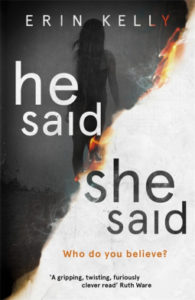I’ve been on a tear with audiobooks recently so, without further ado, here are three I’ve finished in the last few weeks.
He Said/She Said
 Synopsis: He Said/She Said follows Kit and Laura, alternating between their early days of dating to today, ten plus years’ married. Kit is a solar eclipse chaser and, at one of the first festivals where he invites Laura into the fold, Laura interrupts a rape. The repercussions of that rape and the interruption are continuing some fifteen years later when Kit breaks their years of hiding to travel for another eclipse, leaving Laura pregnant at home.
Synopsis: He Said/She Said follows Kit and Laura, alternating between their early days of dating to today, ten plus years’ married. Kit is a solar eclipse chaser and, at one of the first festivals where he invites Laura into the fold, Laura interrupts a rape. The repercussions of that rape and the interruption are continuing some fifteen years later when Kit breaks their years of hiding to travel for another eclipse, leaving Laura pregnant at home.
This is a book I probably should have done a bit more research on before diving in, though I’m not sure even that would have prepared me for this book. All I knew going in was that it was on Modern Mrs. Darcy’s Summer 2017 Reading Guide and it was about solar eclipse chasers—a timely choice since there was the total solar eclipse last summer in the United States. I actually tried to start the book a few times on Kindle but kept not being able to get into it before it was due at the library again. I finally gave up on reading it and reserved the audiobook.
And WOW was there a difference. Where I was feeling ambivalent about reading the book, the audiobook brought this thriller to life for me—the voices of Laura and Kit were chosen well and I’m a sucker for a novel set in Britain read with accents (really, I think any book set outside the United States is almost always better on audio for this reason). I was immediately sucked into Laura’s anxiety over her life in hiding with Kit, Kit’s near-obsession with chasing solar-eclipses now placing them at risk since the impending eclipse means he will be partially coming out of total hiding, like the sun moving out of the moon’s shadow—a metaphor that I suppose only works if solar eclipses lasted the years Kit and Laura have been in hiding.
I should probably have guessed from the title but the central action revolves around a rape accusation—a rape interrupted by Laura during an eclipse fifteen years prior. (Hence my suggestion that I probably should have done research on this one—all the trigger warnings for rape, misogyny, and gaslighting.) In an unexpected turn of events, Laura winds up befriending the victim, Beth, until that friendship places Laura and Kit’s lives in danger. As Kit and Laura tentatively step out of hiding, the events of that day and the players involved come crashing back into their lives.
I think I’ve said this before, but I’m pretty good at predicting where a book, movie, or show is going to go. It drives my boyfriend a little crazy when we’re watching something on television and I can predict what’s about to happen, sometimes down to the way the characters say whatever the big reveal is. He Said/She Said had more than one twist I found surprising—Kelly kept me on the edge of my seat and had twists that were shocking, though not so farfetched as to be implausible. Indeed, even what points Kelly was going to make—is she really going to suggest a woman would lie about rape? Is Men’s Rights really going to make an appearance in this book?—weren’t entirely clear through significant portions of the book. There were moments where I couldn’t stop myself from listening, even though I wasn’t sure if what was about to happen was going to make me angry. Kelly’s agenda wasn’t clear until almost the end of the book—something that is rare and made this book all the more gripping.
The majority of my “reading” of audiobooks is done in the car. The sign of an excellent audiobook is if I choose it over a physical book once I get home. I couldn’t put He Said/She Said down and wound up cleaning my entire house and eating meals staring into space just so I could keep the last half of the audiobook playing. I recommend this one if you can handle the triggers and may be re-listening to this one with the boyfriend if we have a long drive coming up.
Notes
Published: June 6, 2017 by Minotaur Books (@minotaur_books)
Author: Erin Kelly (@erinjelly)
Date read: February 17, 2018
Rating: 4 stars
We Are Okay
 Synopsis: We Are Okay follows Marin, a college student at an unnamed college in New York as she prepares to stay in the dorms over the Winter Break. As you come to learn through Marin’s flashbacks and conversations with a high-school friend/possible former sweetheart who has come to visit, Marin has no other home, having lost her grandfather shortly before she was to start college. The novel explores the reaches of grief, though as the reader comes to understand, Marin’s grief is complicated by the complicated person she discovered her grandfather to be only upon his death.
Synopsis: We Are Okay follows Marin, a college student at an unnamed college in New York as she prepares to stay in the dorms over the Winter Break. As you come to learn through Marin’s flashbacks and conversations with a high-school friend/possible former sweetheart who has come to visit, Marin has no other home, having lost her grandfather shortly before she was to start college. The novel explores the reaches of grief, though as the reader comes to understand, Marin’s grief is complicated by the complicated person she discovered her grandfather to be only upon his death.
I can see why this book was an award winner but for me it was sort of a mellow come-down since I started it the same day I finished He Said/She Said. It was good, but it wasn’t exciting—it’s a slow burn, one that never really ignited for me, though I think this is a book that is deserving of its accolades. I probably just wasn’t in the right place at the right time for this book since it is one to savor rather than devour, and I was in a devouring mood.
I don’t know how the author, Nina LaCour, identifies and I don’t want to label her. What I can say is that she is married to another woman and they have a child together, so at a minimum, her orientation is not strictly heterosexual. I mention this (awkwardly) because I do think it is important to read diverse books and books that speak to the experience of traditionally marginalized populations. In this way, We Are Okay fits into the category of #ownvoices. As the reader swiftly comes to recognize, Marin also doesn’t identify solely as straight and, from what she says as you go further into the book, probably identifies as a lesbian. I say “probably” because Marin’s sexuality is in no way the point of the book, so she doesn’t really talk much about how she identifies on the orientation spectrum. While I valued The Miseducation of Cameron Post (amazing book—you should read it) and Georgia Peaches and Other Forbidden Fruit (okay, but not as good as Cameron Post), those books were mostly about what it was like to come out and live out. Even Aristotle and Dante Discover the Secrets of the Universe, while broader in scope, addressed the sexuality question head-on as a major theme (also amazing and Lin-Manuel Miranda reads the audiobook and, at one point, laments having to learn about Alexander Hamilton which made me pause the book and cry laughing…but I digress). In We Are Okay, Marin is not straight but that’s really the point of the book. Instead, we have a girl who is grieving, whose grief is compounded by losing, at the same time, what was likely her first meaningful romantic relationship. We Are Okay is a book you could easily flip the sex of Marin’s partner and hardly notice a difference. In other words, We Are Okay is powerful in its lack of fanfare—Marin is (probably) a lesbian and that’s hardly worth noting except it’s entirely worth noting and celebrating. We have a book with a lesbian main character acting exactly like heterosexual teenager grieving her grandfather. There is both a universal experience (grief) and a lesbian character presented as simply living her life—exactly as life is. There is representation that matters and there are themes that are universal. We need the Cameron Posts but we also need the books with diverse characters in books that aren’t just about coming out. While We Are Okay didn’t hit the high note for me at the time, I do think this is a valuable book that is well-written and is one I recommend for fans of diverse books and/or YA.
Notes
Published: February 14, 2017 by Dutton Books (@duttonbooks)
Author: Nina LaCour (@nina_lacour)
Date read: February 18, 2018
Rating: 3 1/2 stars
Lillian Boxfish Takes a Walk
 Synopsis: On the last night of 1983, Lillian Boxfish finds herself taking a walk through New York City, reminiscing the good times and the bad, remembering what she was like as the highest paid woman ad-writer of her time, as a poet, as a broken woman, and as she is now—not entirely whole, not entirely all-right, but certainly not like any old lady you know.
Synopsis: On the last night of 1983, Lillian Boxfish finds herself taking a walk through New York City, reminiscing the good times and the bad, remembering what she was like as the highest paid woman ad-writer of her time, as a poet, as a broken woman, and as she is now—not entirely whole, not entirely all-right, but certainly not like any old lady you know.
Keeping with the theme of “okay” books and moving to the other end of the age spectrum, I also listened to the audio of Lillian Boxfish Takes a Walk earlier in the month. The voice for the audio is fantastic—she sounds like the octogenarian Lillian without having a voice that sounded grating or shrill or like the voice actor was trying to sound “old.” With the narrative itself, I have gotten the sense from a few other readers that Lillian Boxfish is a book that several readers gave up on—I do think it takes over a third of the way in until the book picks up sharply. The first third or more is a veeeeeery slooooooow setting of the stage and introduction of Lillian’s character so that when she meets her future husband, the reader experiences a shift of a startling magnitude—it isn’t that Lillian is being inconsistent, but rather, you see how what you thought of Lillian—how what she thought of herself—wasn’t entirely accurate. How others can have a profound and lasting impact on us, even after they are gone.
The struggle with this book, however, is that the first third provides so little payoff that it is hard to feel like continuing to read (or listen) is worth the time—you don’t see that back-end payoff coming, ever. I will admit that if any of the books I had on my hold list for audiobooks had come available at the time, I’m not sure I would have stuck this one out. The first third to half was a driving-only audiobook. The second half swiftly became the laundry-folding, shower-cleaning can’t-put-down variety.
Lillian as a narrator is tongue-in-cheek funny and is the kind of old lady I think I’d like to be. Her snappy one-liners were really the highlight of the book for me. Some of my favorite samples:
“His expression was sheepish enough to supply a Highland village with wool and milk. I cocked a loaded eyebrow.”
“Most of what we consider beauty is manufactured. But the fact of that manufacture does not make it unbeautiful.”
“For though I was raised Protestant, my true religion is actually civility.”
“One need not believe in something for it to happen anyway.”
“Choice is an illusion promoted by the powerful.”
If you’ve got time to invest, Lillian Boxfish may be worth your time but this is ultimately a take-it-or-leave-it book for me.
Notes
Published: January 17, 2017 by St. Martin’s Press (@stmartinspress)
Author: Kathleen Rooney
Date read: February 8, 2018
Rating: 3 stars
Header photo credit : Lee Campbell





 Synposis
Synposis